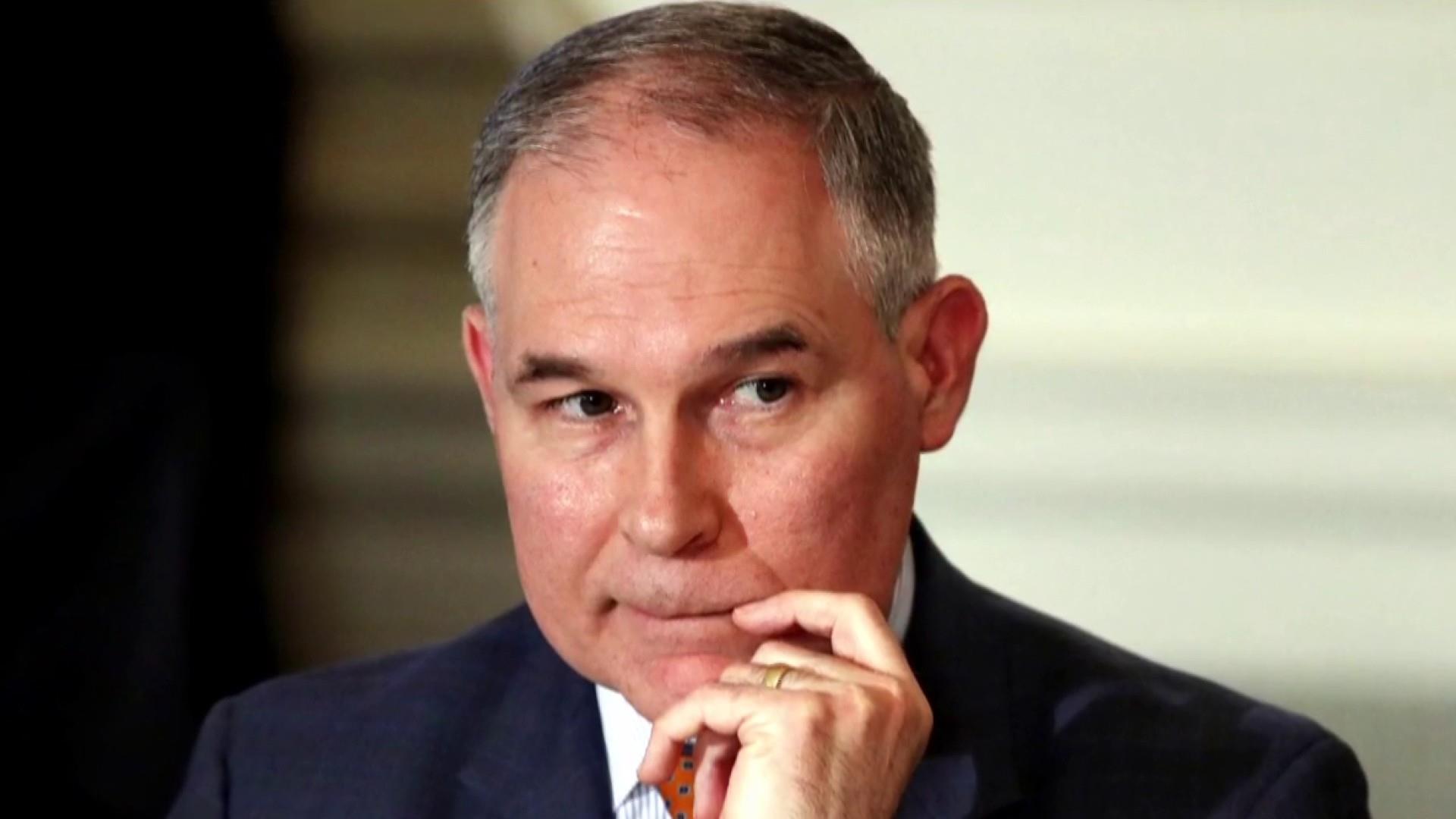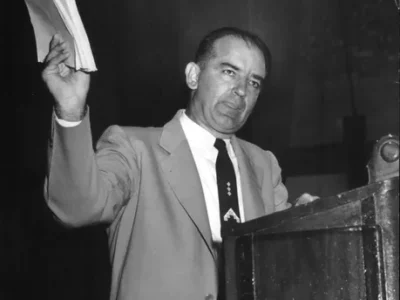The importance of intra-executive branch checks and balances
We are used to thinking of the different branches of government checking each other. Scott Pruitt’s behavior illustrates the need for stronger checks and balances within the executive branch

As Dan recently pointed out, Scott Pruitt has a lot of explaining to do these days, about his housing situation last year, about his travel as EPA Administrator, about how two of his close aides ended up with hefty pay raises, and more. Even Fox News is asking questions.
I want to make a different point based on the troubling conduct of Pruitt and others in the Trump administration. That conduct highlights both the need to “drain the swamp,” as Trump promised but has conspicuously failed to do, and the extent to which doing so requires that some actors in the executive branch have the independence that will let them stand up to swamp monsters.
Scott Jennings, a former adviser to George W. Bush and Mitch McConnell, writes in a CNN commentary that “Liberals don’t really care about Pruitt’s ethics.” Of course that’s not true. It is entirely possible to be offended both by the insouciance of Pruitt and other administration officials about their ethical obligations and by their efforts to undermine their agencies’ missions. Speaking only for myself (and taking no position on whether I qualify as a “liberal”), I care deeply about the administration’s wanton disregard of norms and constraints intended to prevent self-dealing and corruption, and to protect the integrity of government decisionmaking.
I don’t suppose this White House, where ethics complaints go to die, cares (although it surely cares whether Pruitt is a net political plus or minus). But Congress should. Robust requirements for ethical government behavior, transparency, and adherence to applicable law should be bipartisan causes, independent of one’s views on the importance of environmental protection or any other substantive policy. Government ethics requirements already exist, but they need some institutional shoring up, which Congress can and should provide. One key step Congress should take would be to better protect the independence of the career civil servants who are in positions to see, prevent, and expose unethical or illegal behavior by political appointees. Doing so is a legitimate and indeed necessary function of the so-called “deep state.”
Review of the Pruitt scandal shows how hard it currently is for career employees to stand up to an agency head inclined to disregard ethical obligations. When the press got wind that Pruitt had rented a Capitol Hill townhouse from the wife of a prominent fossil fuels-industry lobbyist for $50 per night he slept there, EPA’s initial response was to trot out a memo signed by EPA’s Designated Agency Ethics Official, a career employee, saying that the agency Ethics Office had reviewed the lease agreement and found that it did not constitute a gift. (The memo is available on the Twitter feed of Kevin Bogardus, an E&E News reporter.)
That memo did not pass the straight-face test. For one thing, it was dated March 30, 2018, the day after the story broke on ABC News. Pruitt did not ask the Ethics Office to review the lease in advance or even contemporaneously. He didn’t care until it turned up in the media, at which point he wanted a retroactive blessing, not a serious review. Yet the Ethics Official raised no public murmur of objection to the timing of the request, the speed with which the evaluation was demanded, or the limited information provided.
Moreover, the memo was only a paragraph long, and devoid of any analysis. It simply said that “if the space was utilized for one 30-day month, then the rental cost would be $1500 per month, which is a reasonable market value.” The lease itself was not made public. There was no explanation of how the Ethics Official reached the conclusion that $1500 per month was a reasonable market value, or why a lease that did not require Pruitt to pay $1500 per month should be evaluated as if it did. The New York Times and Walter Shaub, formerly the Director of the Office of Government ethics (among many others) panned the memo.
Facing a barrage of criticism, EPA’s Ethics Office released a new, somewhat longer, memo signed by the same career official. That memo did more to confirm the limits of the Ethics Office’s analysis than to clear the Administrator’s actions. It attached a lease, which ran from February 20 to April 1, 2017. Widely available media reports, however, indicated that Pruitt used the townhouse at least until August, and that his adult daughter lived there with him while serving as a White House intern. The second memo also tried to flesh out its market rate analysis, but again not with any level of conviction. It reflects a quick search on AirBnB for nightly rentals of a single bedroom within a six block radius. There is no evaluation of whether the quality of those rooms was similar to the townhouse Pruitt rented; whether they would allow a tenant to leave belongings there without payment when not present (although the answer to that is pretty obvious); whether they would allow occupancy of a second room without charge (again, the answer is pretty obviously no); or whether they allowed use of other living areas (with or without high-ticket Republican fundraisers going on). There is a brief analysis of the going rental rate in the neighborhood which appears to refute the first memo’s claim that $1500 per month was a market rate. The average rent for one bedroom units in the area was over $2000 per month, without considering quality or size, and remember, Pruitt and his daughter were using two bedrooms over the summer.
At least the second memo does explicitly acknowledge that it was based only on the written terms of the lease. But given the prevalence of reports that use exceeded the written terms of the lease, not to mention the fact that the dates on the lease did not match the dates of occupancy, that bland acknowledgement seems inadequate. Why wouldn’t the Ethics Official insist on the information needed to fully evaluate the transaction?
Nor did either memo address the identity of the parties to the lease. The written document has Steven Hart’s typed name as landlord, crossed out and replaced in handwriting by the name of Vicki Hart, his wife. Steven Hart is a fossil fuel industry lobbyist whose firm’s clients had business before EPA when Pruitt was in the condo.
Why would a career employee lend his name to such patently inadequate analysis? Perhaps rational fear of the consequences of not doing so. The New York Times reports that
At least five officials at the Environmental Protection Agency, four of them high-ranking, were reassigned or demoted, or requested new jobs in the past year after they raised concerns about the spending and management of the agency’s administrator, Scott Pruitt.
Such repercussions are not limited to EPA. A HUD staffer has filed a whistleblower complaint alleging that she was demoted for pushing back against HUD Secretary Ben Carson’s expensive office redecoration plans. But employee concern may well be heightened at EPA, given the administration’s declared intent to shrink agency staff by 50% by 2020.
Perhaps this story is actually a hopeful one — after all, the media has managed to dig up a lot of information about Pruitt’s questionable actions, several complaints have been forwarded to the EPA Inspector General, and there may eventually be political repercussions. But it’s a sharp reminder of the practical difficulties of enforcing government ethics requirements or making questionable conduct transparent, especially in an administration with no discernible commitment to ethics and a strong commitment to enforced employee loyalty.
There are no complete answers to this problem, but here are three easy steps Congress could take that would help.
- Increase the independence of the Office of Government Ethics (OGE) by forbidding removal of the OGE Director for any reason other than malfeasance in office or neglect of duty, as proposed in HR 3462.
- Professionalize ethics oversight within agencies by: requiring that agency ethics officials report to the Director of OGE rather than to their agency head; requiring that agency ethics offices be given the resources necessary to do their job effectively (which means investigating circumstances rather than just documents); and mandating that ethics officials refuse to render ethics opinions unless they are provided with all necessary information.
- Codify the Standards of Ethical Conduct for Employees of the Executive Branch, which are currently OGE regulations, and give them some real teeth. Make disciplinary action mandatory in response to violations; make OGE, rather than the agency, responsible for meting out discipline; require that all disciplinary action for ethics violations be publicly announced; and for serious offenses bar the offender from future government employment, contracts, or lobbying.
The US deserves a government that is run according to the highest ethical standards, without corruption or self-dealing. Ideally we could count on those at the top of the executive branch to ensure that, but people being human we need institutional checks. At the moment, we lack institutions strong enough to routinely assure ethical government. Congress should step up to improve the situation.
UPDATE: The need for Congressional action has been made even clearer by a letter sent to the EPA ethics official by the Acting Director of the Office of Government Ethics, David Apol. The letter notes that serious questions have been raised about whether Pruitt’s conduct, including the rental agreement, his frequent trips home to Oklahoma at taxpayer expense, and his treatment of staff who showed the temerity to stand up to him, violated federal ethics standards. It calls on EPA to investigate and take appropriate action. But does anyone believe that will occur, either voluntarily ewithin the agency, given Pruitt’s attitude, or at the behest of the White House, given its own flagrant disregard for ethical standards? OGE needs the power to independently sanction agency employees, up to and including agency heads.
Reader Comments
One Reply to “The importance of intra-executive branch checks and balances”
Comments are closed.







I’d say that its impossible –not merely hard to do– for any career employee to push back against senior EPA official under any administration. Its a problem that isnt new with Admin. Pruitt. This has been the case since the beginning at EPA and it is also generally the case at state agencies. Congress isnt going to do what the author correctly recommends; it does not exercise the sort of close oversight that would lead them to take such steps. Congress does not do that much oversight–so it doesnt focus on and learn about this, and it doesnt support investigate nor does OIG dissent and whistleblowers in agencies, so it is unlikely to place real checks on Agencys, eg, OIG at EPA has never had any real power to investigate and check EPA. But the author is right. EPA certainly could use it.